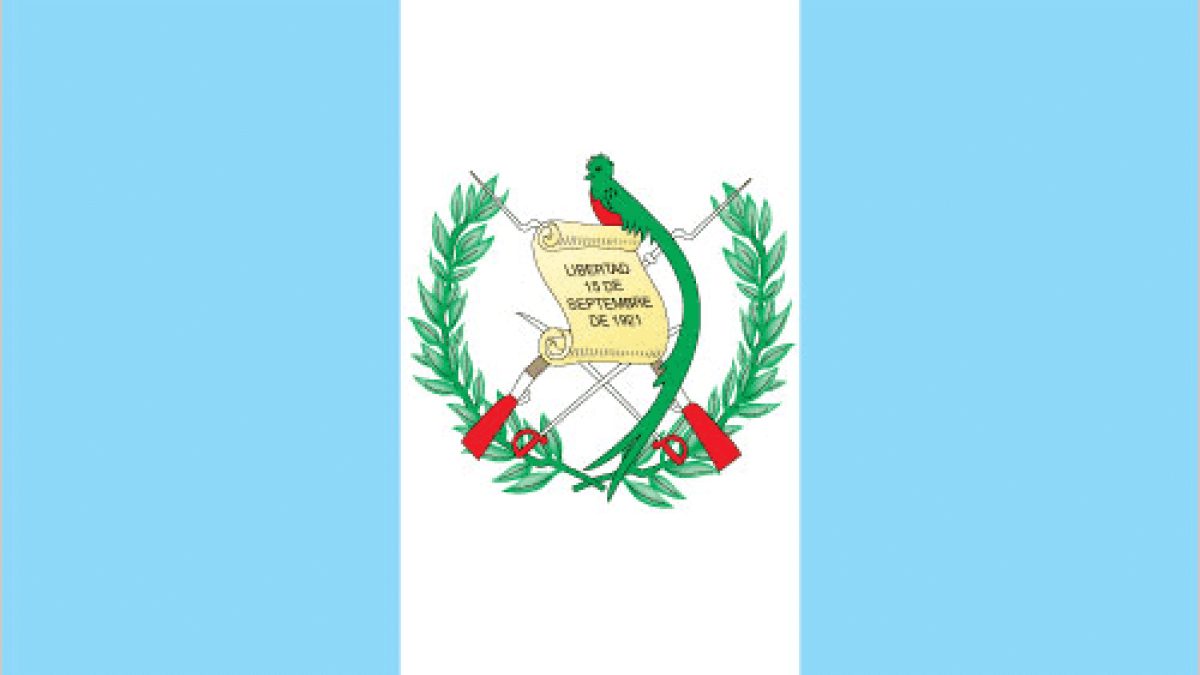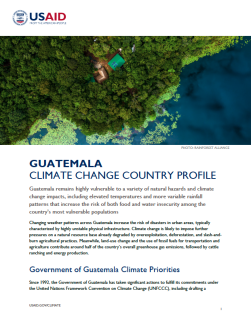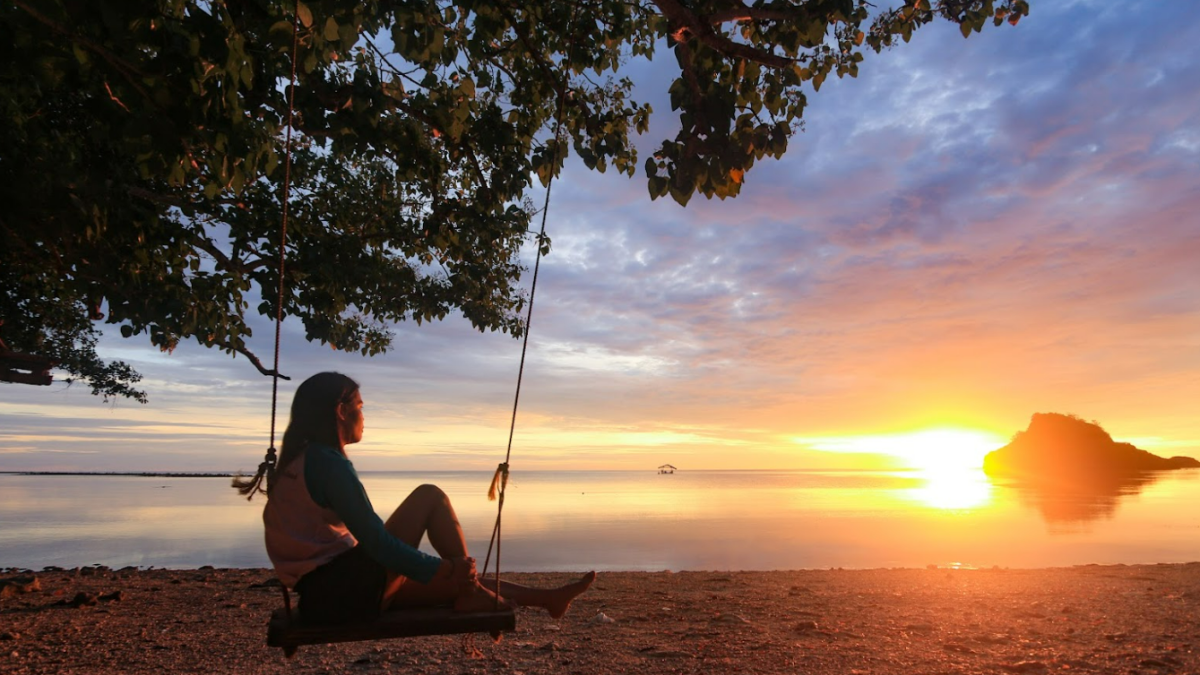Changing weather patterns across Guatemala increase the risk of disasters in urban areas, given that many cities in the country rely on highly unstable physical infrastructure that is vulnerable to flooding. Outside of urban centers, climate change is likely to impose further pressures on a natural resource base already degraded by overexploitation, deforestation, and slash-and-burn agricultural practices. Meanwhile, land-use change and the use of fossil fuels for transportation and agriculture contribute around half of the country’s overall greenhouse gas emissions, followed by cattle ranching and energy production.
Government of Guatemala Climate Priorities
Since 1992, the Government of Guatemala has taken significant actions to fulfill its commitments under the United Nations Framework Convention on Climate Change (UNFCCC), including drafting a National Climate Change Policy, pledging to reduce greenhouse gas emissions in its Intended Nationally Determined Contributions (INDCs), and signing and ratifying the Paris Agreement.
The Government of Guatemala also has a National Climate Change Policy and one of the first climate change laws in the world—the Framework Law on Climate Change. Under this law, the Government of Guatemala created a National Climate Change Council, which serves as a regulatory body for the country’s key economic sectors.
The country’s primary goals relating to mitigation and adaptation under its Nationally Determined Contribution (NDC) include:
- Endorsing the National Low Emission Development Strategy (LEDS), developed with the support of USAID, as the Government of Guatemala’s official strategy for climate change mitigation in the country;
- Reducing more than 11 percent of the country’s total greenhouse gas emissions between the 2005 base year and 2030, meaning that emissions in a baseline, business-as-usual scenario of 53.85 million tons of CO2 equivalent for the year 2030 will be reduced to approximately 47.81 million tons of CO2 equivalent in that year;
- Reducing more than 22 percent of its total greenhouse gas emissions from the 2005 base year by 2030, contingent upon technical and financial support from new international public and private resources; and
- Developing early warning systems and improving access to reliable climate information to lower disaster risks linked to extreme weather events and climate change.
USAID’s Climate Change Program: Objectives and Results
USAID supports the Government of Guatemala’s development and climate priorities through complementary programs and partnerships across the climate adaptation, renewable energy, and natural climate solutions sectors.
Adaptation
USAID enhances the climate resilience of communities and livelihoods within Guatemala’s Western Highlands and Verapaces. These two regions of the country are the most vulnerable to climate change, and are priority regions for climate change adaptation capacity building due to their strong reliance on agriculture, high levels of poverty, proximity to Mexico, and high rates of outward migration.
Value chain activities in Guatemala affiliated with Feed the Future, the U.S. government’s global hunger and food security initiative, utilize an integrated approach to watershed management, land-use management, and water resources management. Feed the Future activities also promote the use of agroforestry and climate-smart agricultural technologies to increase the resilience of crops and soil to extreme weather events and climate pressures, while increasing overall productivity. These technologies include drip irrigation, water catchments, improved seed and tree varieties, soil fertility management and conservation, biopesticides and locally produced organic fertilizers, and locally appropriate agro-structures such as greenhouses, micro- and macro tunnels, and screen houses that provide physical protection from heavy rain and hail.
Meanwhile, the Leveraging Economic Investment through Alliances (LEIA) project is advancing climate adaptation efforts in Guatemala by driving the development of climate-resilient infrastructure. This initiative mobilizes both foreign and domestic investment to enhance infrastructure development, financing, and execution. LEIA strengthens collaboration between governments, the private sector, and local communities, ensuring equitable access to jobs and economic opportunities and fostering sustainable growth. Key focus areas include the promotion of green infrastructure and the development of Eco-Industrial Parks (Eco-Parks), which will position Guatemala as a leader in creating inclusive and environmentally sound economic opportunities.
Key Results
From 2017 to 2023, USAID has helped:
- Implement climate-smart practices, with 38,500 smallholder producers adopting climate-smart agricultural practices on more than 13,520 hectares of land
- Accelerate watershed restoration by implementing 18 watershed management plans directly benefitting more than 13,330 small-scale producers spread across a total area of 122,072 hectares of land in 12 prioritized municipalities that represent key water recharge areas in Guatemala’s Western Highlands
- Improve reforestation practices by helping farmers register more than 13,840 hectares of land in the Government of Guatemala’s forestry incentive program, which generated a collective supplemental income of $7.4 million dollars for more than 3,250 families while enhancing the protection of water recharge sources and the conserving of soils and forests in Guatemala’s Western Highlands
- Drive improvements in coffee production by using agroforestry approaches to enhance more than 7,700 hectares of land supporting coffee production by incorporating rust-resistant varieties of coffee, soil conservation practices, and shade tree reforestation, which benefited more than 5,250 small coffee producers; meanwhile, 2,227,000 coffee seedlings were established on more than 530 hectares of land and more than 174,760 fruit and timber trees with high commercial value—such as avocado, citrus, banana, macadamia, cocoa, orange, peach, and forest species such as cedar and mahogany—were planted in the plots of more than 8,530 small-scale coffee producers to improve coffee agroforestry systems. Install more than 390 solar panels in collection centers, cold rooms, and offices for 10 organizations, consisting of more than 2,110 small-scale producer families, with energy cost savings reinvested into new community projects designed to enhance farmers’ productivity and support the inclusion of women and youth
Natural Climate Solutions
USAID and its partners are mitigating climate change by reducing Guatemala’s primary sources of land based greenhouse gas emissions—deforestation and forest degradation from illegal logging and cattle grazing, and unsustainable land use in the Petén, Alta Verapaz, and Baja Verapaz departments and in the country’s Western Highlands region. By promoting sustainable forest management practices, USAID helps to increase forest cover, forest productivity, and rural economic development, establish agroforestry systems; and incentivize reforestation and forest restoration. USAID also works to strengthen partnerships to improve forest fire monitoring on public and private lands through enhanced training and the provision of equipment to Guatemala’s community fire brigades, park guards, and other government entities.
Meanwhile, the Government of Guatemala, with support from USAID and others, maintains contracts with community groups in the Maya Biosphere Reserve in the Petén region that generate significant income from the sustainable management of more than 500,000 hectares of Forest Stewardship Council–certified forests. Between 2020 and 2022—and based on positive impacts from the contracts’ initial 25 years of implementation—the Government of Guatemala renewed the community concessions contracts for an additional 25 years. In 2022, the Government of Guatemala also established two additional community-managed concessions, bringing the total to 11. Through these concessions, community incomes are expected to further increase with the continued market recognition of certified sustainable forest products. Communities typically invest about 45 percent of the income generated from these sales to protect forests against fires and other threats related to land-use change. To further safeguard gains in sustainable forest management, USAID supports periodic evaluations to facilitate the extension of community forest concessions in the Mayan Biosphere Reserve beyond current agreement periods and supports policy initiatives to reinitiate expired or canceled concessions.
Expected Results
Between 2023 and 2028, USAID expects to:
- Advance forest product development by achieving product and service sales of at least $80 million, with steady growth in annual assets and earnings
- Drive job growth in the forest sector by creating approximately 11,000 full-time–equivalent jobs—which will be linked to low-emission value chains—for indigenous residents, women, and youth in forest-dependent communities
- Help certify 516,000 hectares of forest through Forest Stewardship Council certifications, allowing forest-dependent communities to undertake economically viable, environmentally conscious forest management
- Sequester carbon on more than 1.8 million hectares of land dedicated to agriculture, forests, and agroforestry systems by reducing and capturing greenhouse gases equivalent to more than 10 million tons of CO2
Renewable Energy
USAID promotes the generation and use of renewable energy and energy-efficient, low-emission infrastructure, technologies, and production processes. Examples of these efforts efforts include feasibility studies for a solar energy generating plant in the municipality of Quetzaltenango with an installed power of 1.88 megawatts (MW), which has the potential to generate 4,300 megawatt hours (MWh) annually, reduce CO2 emissions by more than 1,820 tons annually, and provide electricity to 10,000 people. Meanwhile, in the municipality of Huehuetenango, USAID has supported a campaign to convert existing street lighting to energy-efficient LED lighting, which is expected to reduce CO2 emissions by more than 1,350 tons annually, save 3,385 MWh, and benefit 60,000 local residents. In the Western Highlands, USAID is supporting the Guatemala Entrepreneurship Development Initiative to develop new financing mechanisms to help increase investment in renewable energy and energy efficiency. Since August 2022, these activities have facilitated approximately $4.2 million in investments for the renewable energy sector and reduced carbon emissions by at least 920 tons of CO2. Partnerships with business accelerators and incubators have also facilitated business technical assistance, capacity building, and investment support to 12 renewable energy companies with nationwide outreach, positively impacting more than 1,000 direct beneficiaries.
USAID is further promoting the use of clean energy in the Western Highlands through the installation of solar panels and solar dryers in coffee cooperatives and agriculture schools, thereby reducing labor requirements and operating costs while creating better-quality coffee independent of traditional fuel-based dryers. Additionally, nine solar panels were installed at six cooperatives in Huehuetenango, two cooperatives in San Marcos, and one cooperative in the Camojá Complex to reduce greenhouse gas emissions, minimize the cost of electric power, and increase the competitiveness of small-scale coffee producer cooperatives. In the same region, USAID provided solar panels to schools damaged by Hurricanes Eta and Iota as part of a project preparing schools to re-open following COVID-19 closures.
Meanwhile, to support clean energy training and capacity building, USAID is working with nearly 400 youth—50 percent of whom are female—to help provide technical training in clean energy as part of technical vocational training or as a complement to training in sustainable agricultural practices.
Finally, to promote rural electrification, USAID will help identify and develop clean, reliable energy resources for unelectrified communities in Guatemala to increase economic development and improve local and national capacity for achieving a transition to clean energy. These efforts will focus on priority rural areas—including Alta Verapaz, Baja Verapaz, the Western Highlands, and other areas of Guatemala with relatively low access to a clean, reliable electricity supply—to help reduce costs for consumers, drive sustainable economic growth, and contribute to Guatemala’s broader efforts to reduce greenhouse gas emissions.
For More Information




